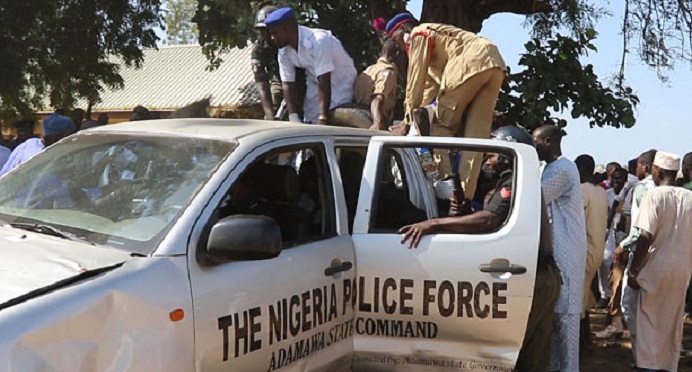The bomb went off just after 8pm on Tuesday night close to a lorry park and livestock market in the crowded city, which plays host to some of the 2.3 million refugees driven from their homes by the Islamic uprising.
Five days earlier, the country’s president Muhammadu Buhari, who previously led Nigeria under a 1980s military dictatorship, visited some of their camps in the city and declared that Boko Haram would “soon be a thing of the past”.
Approximately 80 people were reported to have been injured in Tuesday night’s blast. Hospital sources said six women and eight children were among those killed, with the poor power supply in Yola and nightfall hampering the rescue effort.
It was the first to follow a three-week gap in attacks after the Nigerianmilitary claimed to have successful foiled a series of suicide bombings as well as continuing its raids on Boko Haram camps and bomb factories.
Mr Buhari pledged at his election in April to have the Isil-aligned terror group on the run by Christmas.
Mr Buhari claimed “thousands of lives” would have been saved had his predecessor tackled corruption hampering the fight against Boko Haram.
Late on Tuesday night, he announced the arrest of Sambo Dasuki, his predecessor Goodluck Jonathan’s national security adviser, for allegedly siphoning off billions from funds meant to equip soldiers.
A presidential committee set up by Mr Buhari has reported that it uncovered fraudulent and fictitious arms contracts amounting to $5.4 billion dating back to 2007, according to Femi Adesina, a presidential adviser.
Mr Dasuki, who was reportedly one of four majors who arrested Mr Buhari during the 1985 coup that unseated him, is accused of awarding "phantom contracts" to buy 12 helicopters, four fighter jets and munitions worth $2.9 billion that never were supplied.
Local reports suggested that of a total “intervention fund” for fighting Boko Haram of around $3.2 billion, only 26 per cent was actually used for procurement of equipment that could subsequently be accounted for.
“The findings made so far are extremely worrying considering that the interventions were granted within the same period that our troops fighting the insurgency in the northeast were in desperate need of platforms, military equipment and ammunition,” Mr Buhari said.
“Had the funds siphoned to these non-performing companies been properly used for the purpose they were meant for, thousands of needless Nigerian deaths would have been avoided.”
Mr Dasuki is the second scalp from the Jonathan era to be claimed by his successor. Last month, Diezani Alison-Madueke, Nigeria`s oil minister from 2010 until May 2015, was arrested in London.
Mr Buhari has also ordered a review of the pending courts martial of scores of soldiers accused of deserting the fight against Boko Haram – they said because of equipment shortages which saw them going into battle on empty stomachs and armed with just 30 bullets each.
During Mr Jonathan’s time in office, questions were repeatedly asked about how Nigeria’s once respected and powerful military could have ceded an area the size of Belgium to the extremists, prompting the displacement of 2.3m people and the deaths of over 17,000.
Mr Dasuki denied any wrongdoing in an interview on Tuesday night with the PR Nigeria news agency.
More about:
















































